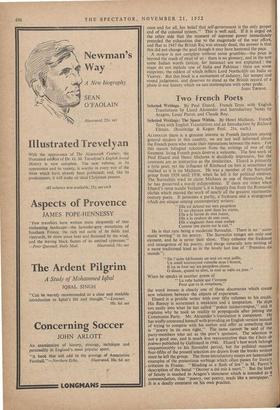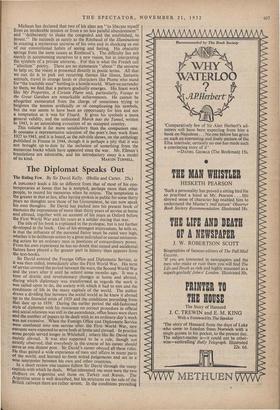Two French Poets
Selected Writings. By Paul Eluard. French Texts with English Translations by Lloyd Alexander and Introductory Notes by Aragon, Louis Parrot and Claude Roy.
Selected Writings: The Space Within, By Henri Michaux. French . Texts with English Translations and an Introduction by Richard Ellman. (Routledge & Kegan Paul. 21s. each.) ALTHOUGH there is a genuine interest in French literature among general readers in this country, we are not well informed about the French poets who made their reputations between the wars. For this reason bilingual selections from the writings of two of the foremost living French poets deserve a welcome. The best work of Paul Eluard and Henri Michaux is decidedly impressive, but the contrasts are as instructive as the similarities. Eluard is primarily a lyric poet, yet the influence of Rimbaud on him is sometimes as marked as it is on Michaux. He was a member of the Surrealist group from 1924 until 1938, when he left it for political motives, The Surrealists tried to claim Michaux as one of themselves, but
he has preserved a sturdy independence. If there are times when Eluard's verse recalls Verlaine's, it is happily free from the Romantic clichés which marred the work of nearly all the greatest nineteenth- century poets. It possesses a purity, a freshness and a strangeness which are unique among contemporary writers:
" Elle est debout sur mes paupieres
Et ses cheveux sont dans les miens, Elle a la forme de mes mains, Elle a la couleur de mes yeux, Elle s'engloutit dans mon ombre Comme une pierre sur le ciel."
He is that rare being a moderate Surrealist. There is no "auto-
matic writing" in his poetry. The Surrealist images are only one element, and he is never their slave. They enhance the freshness and strangeness of his poetry, and merge naturally into writing of a more traditional kind as in the lovely last line of "Premiere du monde":
"De l'aube baillonnee un seul cri veut jaillir,
Un soleil tournoyant ruisselle sous l'ecorce,
11 ira se fixer sur tes paupieres closes.
0 douce, quand tu dors, la nuit se male au jour."
When he speaks in another poem of
" La robe habile qui t'invente Pour que tu la remplaces," the word invente is clearly one of those discoveries which create new relations between the objects of experience.. Eluard is a prolific writer with over fifty volumes to his credit. His fluency is sometimes a weakness and a temptation. He slips too easily into what he has called "poesie ininterrompue," and it explains why he took so readily to propaganda after joining the Communist Party. Mr. Alexander's translation is competent. He has wisely contented himself with providing an English version instead of trying to compete with his author and offer us something that is "poetry in its own right." The same cannot be said of the party-members who act as the poet's sponsors. The selection is not a good one, and is much less representative than the Choir de poemes published by Gallimard in 1946. Eluard's best work belongs unquestionably to his Surrealist period, but for political reasons four-fifths of the present selection are drawn from the books written since he left the group. The three introductory essays are lamentable examples of the pretentious verbiage which often passes for literary criticism in France. "Blinding as a flash of fire" is M. Parrot's description of the banal "Decour a ate mis i1 mort." But the limit of fatuity is reached in Aragon's statement which is intended as a commendation, that "poetry, our poetry, reads like a newspaper." It is a deadly comment on his own practice. Michaux has declared that two of his aims are "to liberate myself from an intolerable tension or from a no less painful abandonment" and "deliberately to shake the congealed and the established, to invent." He succeeds as surely as the Rimbaud of the Illuminations in creating a mysterious universe of his own and in shocking us out of our conventional habits of seeing and feeling. His obscurity springs from the same causes as Rimbaud's. The difficulty lies not merely in accustoming ourselves to a new vision, but in, interpreting the symbols of a private universe. For this is what the French call "absolute" poetry. There are no statements "about" the universe to help us; the vision is presented directly in poetic terms. All that we can do is to pick out recurring themes like illness, fantastic animals, travel in strange lands or characters like Plume who stand for "the tractable man" battling in a hostile world. When we surrender to them, we find that a pattern gradually emerges. His finest work like My Properties, A Certain Plume and, particularly, Voyage to the Great Garaban are remarkable achievements. He cannot be altogether exonerated from the charge of sometimes trying to heighten the tension artificially or of complicating his symbols, but the war seems to have been an opportunity for him and not a temptation as it was for Eluard. It gives his symbols a more general validity, and the unfinished March into the Tunnel, written m 1943, is an astonishing evocation of an occupied country.
This volume is far more satisfactory than the companion one. It contains a representative, selection of the pciet's best work from 1927 to 1943, and it is based, as the sub-title shows, on the anthology published in France in 1944, though it is perhaps a pity that it was not brought up to date by the inclusion of something from the numerous books which have appeared since the war. Mr. Ellman's translations are admirable, and his introductory essay is a model











































































 Previous page
Previous page